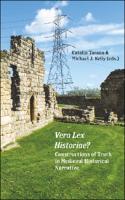Vera Lex Historiae?
Constructions of Truth in Medieval Historical Narrative
Contributor(s)
Taranu, Catalin (editor)
Kelly, Michael J. (editor)
Collection
ScholarLedLanguage
EnglishAbstract
In his Historia Ecclesiastica Gentis Anglorum (circa 731 CE), Bede says that he will write his account of the past of the English following only vera lex historiae (the true law of history). Whether explicitly or implicitly, historians narrate the past according to conceptions of what constitutes historical truth that emerge in the use of narrative strategies, formulae, and other textual forms, in establishing one’s ideological authority or that of one’s informants, and in faithfulness to a cultural, narrative, or poetic tradition. But what if we extend the scope of what we understand by history (especially in premodern settings) to include not just the writings of historians legitimated by the Latinate matrix of Christianized classical history writing, but also collective narratives, practices, rituals, oral poetry, liturgy, artistic representations, and acts of identity? In these genres of re-enacting the past as, or as representation of, the present, we find a plethora of modes of constructions of historical truth, narrative authority, and reliability.
Vera Lex Historiae? comprises contributions that reveal the variety of evental strategies by which historical truth was constructed in late antiquity and the earlier Middle Ages, and the range of procedures by which such narratives were first established as being historical and then as “true” histories. This is not only a matter of narrative strategies, but also of habitus — ways of living and acting in the world that are deeply imbricated with the commemoration and re-enactment of the past by communities and by individuals. In doing this, Vera Lex Historiae? aims to recover something of the plurality of modes of preserving and reenacting the past available in late antiquity and the earlier middle ages which we often overlook because of preconceived notions of what constitutes history writing.
Keywords
Bede;Early Middle Ages;historiography;Medieval Studies;narratives;truthDOI
10.53288/0369.1.00ISBN
9781685710309, 9781685710316Publisher
punctum booksPublisher website
https://punctumbooks.com/Publication date and place
2022Imprint
Gracchi BooksClassification
Europe
c 500 to c 1000 CE
History and Archaeology
CE period up to c 1500


 Download
Download Web Shop
Web Shop